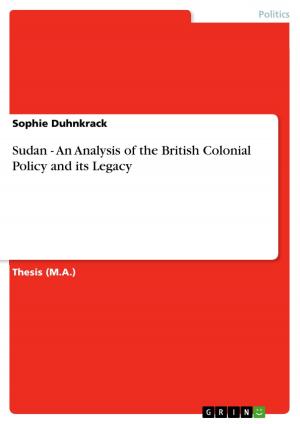Slavery and Religion in Antebellum America
Nonfiction, Reference & Language, Study Aids, ESL, Foreign Languages| Author: | Jascha Walter | ISBN: | 9783638429948 |
| Publisher: | GRIN Publishing | Publication: | October 19, 2005 |
| Imprint: | GRIN Publishing | Language: | English |
| Author: | Jascha Walter |
| ISBN: | 9783638429948 |
| Publisher: | GRIN Publishing |
| Publication: | October 19, 2005 |
| Imprint: | GRIN Publishing |
| Language: | English |
Seminar paper from the year 2004 in the subject English Language and Literature Studies - Culture and Applied Geography, grade: 1-, Otto-von-Guericke-University Magdeburg (Institut für fremdsprachliche Philologien), 12 entries in the bibliography, language: English, abstract: My original plan, to compare the northern and southern states of antebellum America with regard to the influence of religion on the attitude to slavery, proved to be problematic, because of the difficulties connected with getting information about the local residences of the different denominations. I found a lot of information about several aspects dealing with connections between religion and slavery, and thus I concentrated on the other aspect of the title, which were southern proslavery argumentations. As far as the idea of comparison is concerned, I collected information about the different denominations of antebellum America and their contribution to abolition or their indifference and inability to take a stand against slavery. To find relevant secondary literature I searched the university library Magdeburg, the university library Hamburg and the digital library of the 'Making of America' website. I also found secondary literature in the internet through a search via the search engine www.google.de. First I want to present the different churches and denominations of antebellum America and their attitude to slavery. In most cases a development in the attitude can be observed. The second part of this essay concentrates on religiously oriented proslavery argumentations and is separated in different approaches and biblical aspects. The final topic deals with the conversion of slaves, which I found interesting, too, but I decided to mention this aspect only to some extent, because the centre of attention was supposed to be the attitude to slavery in connection to religion. Since I found more information than I initially had expected, I found myself compelled to make more footnotes, than I would have preferred to do. Since this is caused by the wealth of information, I ask to be excused for this.
Seminar paper from the year 2004 in the subject English Language and Literature Studies - Culture and Applied Geography, grade: 1-, Otto-von-Guericke-University Magdeburg (Institut für fremdsprachliche Philologien), 12 entries in the bibliography, language: English, abstract: My original plan, to compare the northern and southern states of antebellum America with regard to the influence of religion on the attitude to slavery, proved to be problematic, because of the difficulties connected with getting information about the local residences of the different denominations. I found a lot of information about several aspects dealing with connections between religion and slavery, and thus I concentrated on the other aspect of the title, which were southern proslavery argumentations. As far as the idea of comparison is concerned, I collected information about the different denominations of antebellum America and their contribution to abolition or their indifference and inability to take a stand against slavery. To find relevant secondary literature I searched the university library Magdeburg, the university library Hamburg and the digital library of the 'Making of America' website. I also found secondary literature in the internet through a search via the search engine www.google.de. First I want to present the different churches and denominations of antebellum America and their attitude to slavery. In most cases a development in the attitude can be observed. The second part of this essay concentrates on religiously oriented proslavery argumentations and is separated in different approaches and biblical aspects. The final topic deals with the conversion of slaves, which I found interesting, too, but I decided to mention this aspect only to some extent, because the centre of attention was supposed to be the attitude to slavery in connection to religion. Since I found more information than I initially had expected, I found myself compelled to make more footnotes, than I would have preferred to do. Since this is caused by the wealth of information, I ask to be excused for this.















